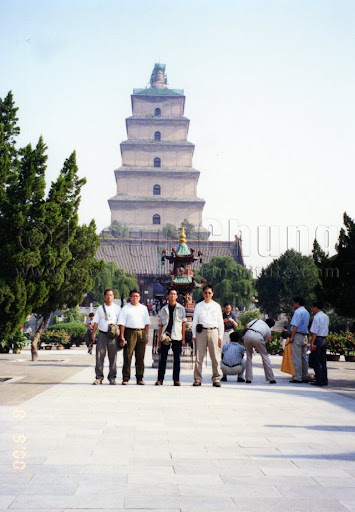
My Feng Shui researches 15 - Tai Ngan (Big Wild Goose) Pagoda 大雁塔
Date 2012/4/12 22:40:00 | Topic: Master Chung's Articles
| My Feng Shui researches 15 - Tai Ngan (Big Wild Goose) Pagoda 大雁塔
In the Chinese history, there are 3 major invitations of the Buddha’s Bibles back to China doing the translation work, first one in the East Hon漢 dynasty, second one in the Jun晉 dynasty and the last one in Tong唐 dynasty. Most popular one was known by the public was the last one in Tong dynasty. A story book, “Journey To The West西遊記” created from this foundation and published in Ming明 dynasty.
Inside the story, the writer created 3 disciples to the Monk Yuen Chong玄奘 as a story line. His disciples have different characters, the elder disciple is a monkey, the second disciple is a pig and the third disciple is a hardworking monk. The writer used his knowledge in Taoism and Buddhism to character these three disciples to represent the different stage of Taoism and Buddhism practice. Due to the writer’s good writing skill, this story book became popular as one of the famous literatures in China. This story also filmed as a movie.

After Monk Yuen Chong玄奘 back to China, he advised the King, Tai Chung太宗, to build this Tai Ngan Pagoda for him to store the Buddha’s Bible in AC652. It had only five floors when it first built, and then it changed to seven floors by the first Chinese Queen, Mo Jut Tin. After AC706, all the top 3 candidates in public examination results were announced in the stone board under the pagoda. That was the high honour to recognize the hard working for the students. A Chinese idiom, “Ngan Tap Tigh Ming 雁塔題名” was coming from there.

Translation is not an easy work, the translator needed to be good in both literature and translated language. Especially for the religious has more high requirement, those translators were a monk and deep in Buddhism who had high education in the country. They could not base on their thinking and favours to do the translation because it would give a negatively affect the authenticity of Buddhism for the public. Every translation needed to be approved by the other translators. When the Buddha’s book has a mantra, then the translator only did the same pronouncing translation. So when you read a Buddha’s Bible, you are not only learning the Buddhism but also the good Chinese literature.
If you like to learn more, please subscribe.
If you find my articles which may be interested to your friends, please don’t hesitate to share it to them.
|
|